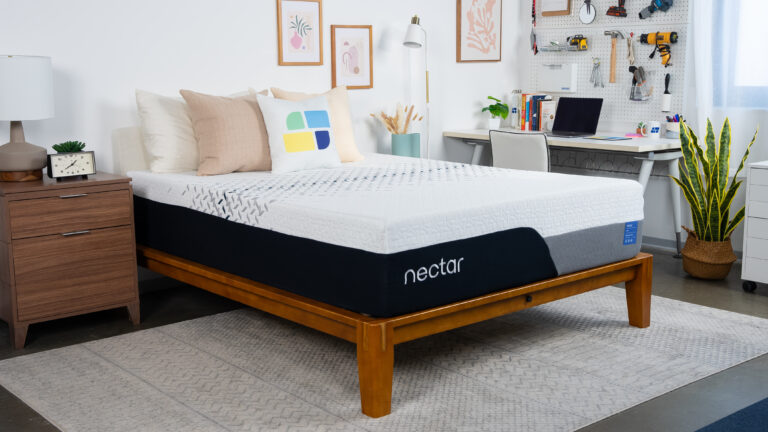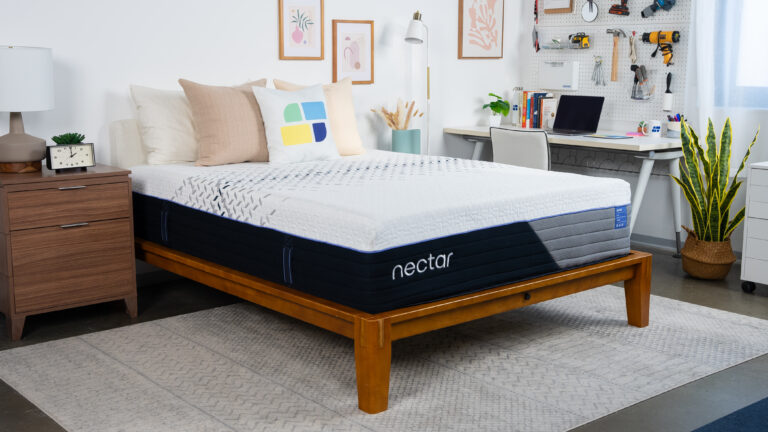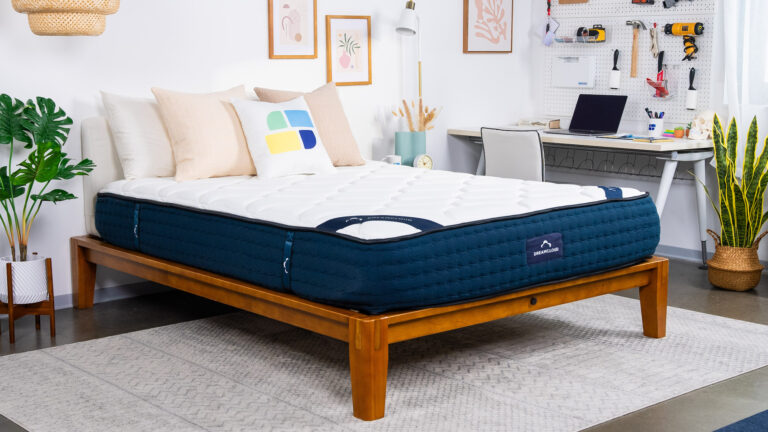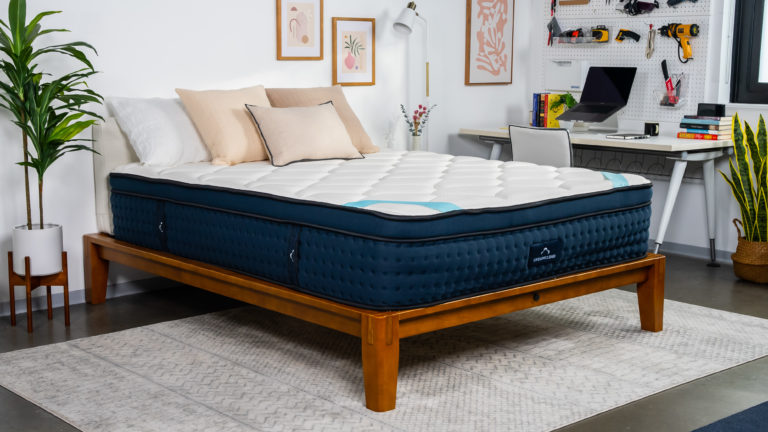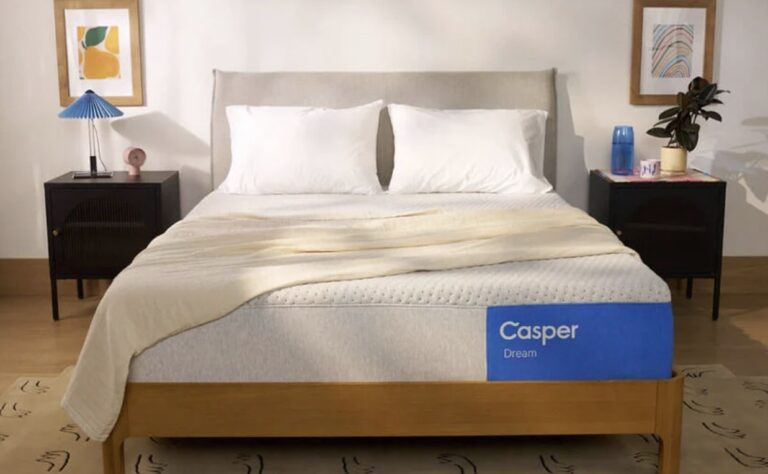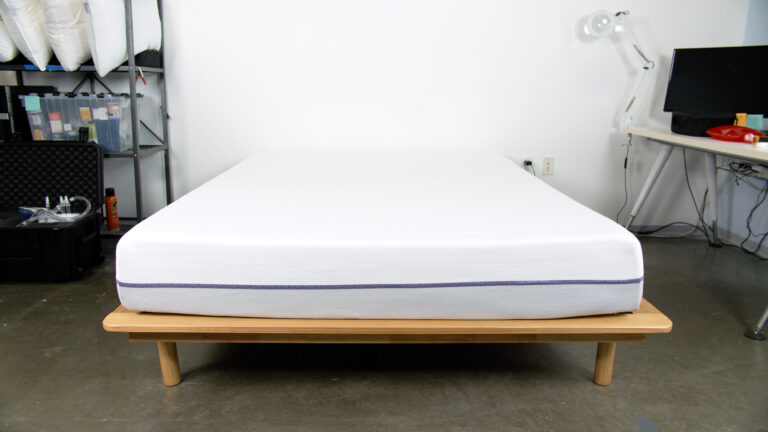When you buy through our links, we may earn a commission. Products or services may be offered by an affiliated entity. Learn more.
Nectar vs. DreamCloud Mattress Comparison
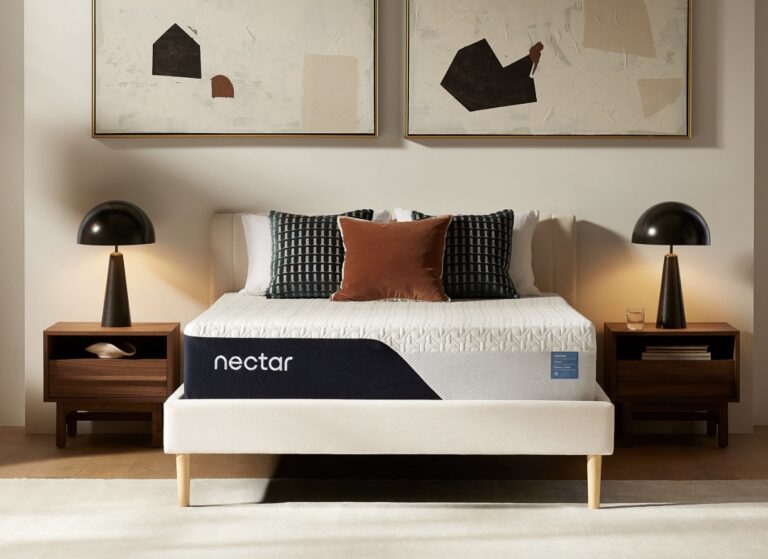
Nectar Classic
Bottom Line
The affordable, all-foam Nectar offers ample cushioning for side sleeping and relief from bothersome pressure buildup.
Save 50% on mattresses & 66% on bundles
Full Mattress ReviewVS
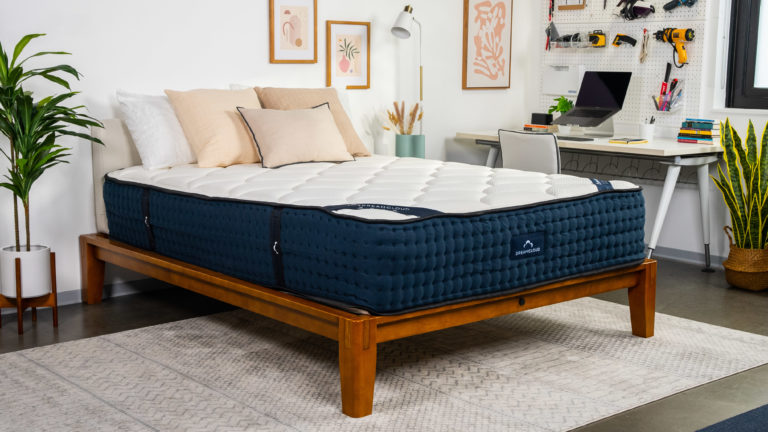
DreamCloud Memory Foam Mattress
Bottom Line
The DreamCloud is both luxuriously crafted and affordably priced with cushy foam layers and a robust coil support system.
Save up to 60% on mattresses
Full Mattress ReviewBudget-friendly memory foam beds from the same parent company: what’s the difference?
Nectar and DreamCloud, two large players in the mattress-in-a-box retail space, are actually owned by the same parent company. That said, the two are distinct brands with construction methods and materials that vary from one another. We’ve examined and reviewed nearly every mattress that they manufacture, and we’ve found that some are excellent options for our readers.
In this comparison, we’ll take a close look at two all-foam beds – the flagship Nectar Mattress and the DreamCloud Memory Foam Mattress. Nectar and DreamCloud also offer these beds in hybrid versions that carry slightly higher price-points.
We’ll explain how they fared during our sleep lab trials and offer details from our testing team. You’ll learn which model is better for your sleeper type and body weight, and you’ll also find out whether we think either bed is a good value. Additionally, we’ve included reports from real-life customers who’ve owned the beds for a while and know how they perform long-term.
Quick Look
$649
$999
Medium Firm (6)
Medium Firm (6)
- Isolates motion well
- Excels at relieving pressure
- Sleeps cool
- Excellent pressure relief
- 365 nights (30-night requirement)
- Lifetime, Limited
- 365 nights (30-night requirement)
- Lifetime, limited
- A+
- A+
Our Testing Team’s Take
We know beds – we’ve tested almost 2,000 of them in our Seattle sleep lab. When we review or compare mattresses, we put them through the same series of tests, measuring qualities like motion isolation, pressure relief, and temperature regulation.
We also try them out ourselves – in the lab and at home. Our testing team is made up of people who represent a range of sleeper types and body weights, which helps us gauge who will like a particular mattress model best. Our picks for the best mattresses are time-tested and thoroughly reviewed.
Our Verdict
The Nectar Mattress and the DreamCloud Memory Foam Mattress are pretty similar in terms of materials, cost, and quality. Regardless of which one you purchase, you can trust that it will be a well-made bed with excellent policies backing it. Both have a medium firm feel that’s a 6 out of 10 on our firmness scale, which is a crowd-pleaser. Though they’re quite alike, these two beds have some notable performance differences.

Jackson Lindeke
Executive Product Director
Side sleeper
180 lbs.
Showers before bed
“When I first brought the Nectar home, I was pleasantly surprised by how firm and supportive it felt. Despite the memory foam feel, I still found it relatively easy to move around and didn’t get the “stuck feeling” I often get with beds of this type. I did wake up feeling a bit hot one of the nights, but this isn’t abnormal during the summer, when I tested it.”
You’ll find either option a good bet if you want motion isolation and pressure relief. Hot sleepers should look to the Nectar Classic Hybrid or the DreamCloud Premier, which are hybrid versions of these beds that sleep cooler than the all-foam models. The edge support on the Nectar is stronger, which is something to consider if you sleep at the side of the bed or have mobility limitations. However, the DreamCloud is slightly easier to move around on than the Nectar.

Mary Fenton
Head of Product Content
Combo sleeper
150 lbs.
Sleeps with noise machine
“As a combination sleeper, I appreciated the ability to get support from the DreamCloud in different sleeping positions. I liked how even though it offered moderate contouring, I never felt like I was sinking into the mattress.”
Construction and Materials
Though these two beds have all-foam constructions, their materials differ. Learn more in the table below.
| Construction Analysis | Nectar Classic | DreamCloud Memory Foam Mattress |
|---|---|---|
| Cover | Polyester, polyethylene, and nylon blend | Cashmere blend |
| Comfort Layer | 1” memory foam (gel-infused) | Memory foam (gel-infused) Polyfoam Memory foam (gel-infused) |
| Transitional Layer | 3” polyfoam | Polyfoam (gel-infused) |
| Support Core | 8” polyfoam | Polyfoam |
Nectar Mattress Breakdown
The Nectar Mattress is an all-foam model with three layers and a medium firm (6) feel. Its comfort layer is a 1-inch gel-infused memory foam that’s designed to relieve pressure and adapt to your shape without trapping any of your body heat. The transitional layer is made from 3 inches of polyfoam that’s formulated to feel more responsive than the layer above. Its main aim is to keep you from sinking into the support core below.
The support core also features polyfoam. It’s a thick, 8-inch layer that offers stability and strong support to help keep your spine evenly aligned. The mattress has two cover fabrics. The top is made from a proprietary material that’s woven with cooling fibers, while the bottom is a grippy, shift-resistant fabric. In total, the Nectar Mattress measures 12 inches tall.
DreamCloud Memory Foam Mattress Breakdown
The DreamCloud Memory Foam Mattress has a slightly more complex construction than the Nectar Mattress. Its comfort system has three foam layers. The first is gel-infused memory foam that’s quilted into the cashmere blend cover and the second is quilted polyfoam. Together, they offer cushioning and support.
The next comfort layer is also made from gel-infused memory foam. It follows your body’s shape to absorb impact, disperse weight, and prevent pressure points from developing. A transitional layer of gel-infused polyfoam minimizes motion transfer while ensuring your spine and lumbar get strong support and relief from back pain.
The polyfoam support core lends structure to the other layers and pushes back against your body to prevent you from sinking into the mattress. The bottom cover has shift-resistant fabric and handles to make moving the bed easier.
Mattress Sizing and Weight
The Nectar and DreamCloud have the same 12-inch height. This is on the upper end of average, most standard sheets should work but you may find that deep-pocket sheets fit better. The DreamCloud outweighs the Nectar but both beds are about what you’d expect from a foam mattress. You can add White Glove delivery to either purchase if you need help moving the bed.
Both are available in the same standard size range: twin, twin XL, full, queen, king, California king, and split king.
| Mattress Model | Profile | Weight |
|---|---|---|
| Nectar Classic | 12″ | 66 lbs. |
| DreamCloud Memory Foam Mattress | 12″ | 78 lbs. |
Performance Ratings
Considering how much memory foam the Nectar and DreamCloud Memory Foam Mattresses have, it’s not surprising that they both provide deep, effective pressure relief and exceptional motion isolation. Light sleepers and people with joint pain should find either one a worthy choice. The foam does have a few drawbacks, however.
It’s not particularly easy to move around on either mattress without getting a bit stuck. The foam compresses and restricts movement, so if you’re someone who likes a responsive bed, this may be a dealbreaker. The Nectar has stronger edge support than the DreamCloud but it’s not super robust at the perimeter either.
Temperature-wise, neither mattress comes out on top. The gel infusions make a difference and keep the beds cooler than they would be without them, but hot sleepers may prefer the hybrid versions of both these beds, which are much better at regulating temperature.
The Nectar and DreamCloud got pretty similar scores from our sleep testers. Both got high marks from those between 130 and 230 pounds, especially people who sleep on their backs or sides. They were tougher sells for the stomach sleepers, who didn’t like the compressive surfaces and would have preferred a more even feel.
Mattress Pricing
Memory foam mattresses tend to be more affordable than hybrids, innerspring, and latex beds because they have simpler constructions. The Nectar Mattress and DreamCloud Memory Foam Mattress are a solid value and quite affordable.
Price-wise, they’re both in the middle ground between the cheapest mattresses and more premium, luxe options. The DreamCloud costs a bit more than the Nectar, but they’re comparable and since they have the same parent company, they come with identical policies. During durability tests, they got the same score showing that they may have slightly above-average lifespans.
| Policy | Nectar Classic | DreamCloud Memory Foam Mattress |
|---|---|---|
| Sleep Trial | 365 nights | 365 nights |
| Warranty | Lifetime, limited | Lifetime, limited |
| Shipping | Free to contiguous U.S. | Free to contiguous U.S. |
| White Glove Delivery | Available for an added fee | Available for an added fee |
What Customers Are Saying
Nectar Mattress owners are pleased with its affordability, lengthy sleep trail, and lifetime warranty. It also got rave reviews from side sleepers and people who have hip and joint pain. Customers report that the mattress isn’t too hot and that it’s fairly breathable compared to other memory foam beds. Its edge support falls short and some customers think it feels softer than other medium firm beds.
The DreamCloud Memory Foam Mattress gets excellent reports for its motion isolation. Couples say they can sleep on the bed without disturbing each other. Back and stomach sleepers also say that it gives them the extra support they need. Like the Nectar, the DreamCloud gets praise for sleeping cooler than other memory foam mattresses. However, some feel that it’s too firm and that the bed is heavy and difficult to move.

Still have questions? Ask our community!
Join our Sleep Care Community — a trusted hub of product specialists, sleep health professionals, and people just like you. Whether you’re searching for the perfect mattress or need expert sleep advice, we’ve got you covered. Get personalized guidance from the experts who know sleep best.

